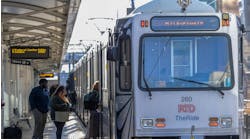As part of an annual review process, Rock Region Metro is planning system service enhancements, including proposed changes for 14 of its 26 bus routes. A fare review, the first since 2009, is also underway. The agency will host five public information meetings in late July to share information on specific proposals, which would take effect in October.
“We did not get the quarter-penny sales tax to fund public transit that would have funded the MOVE Central Arkansas bus service improvement plan, which included major system improvements. Now, we’re exploring how we can take low- or no-cost pieces of the MOVE Central Arkansas plan and make minor improvements within the constraints of our current funding structure,” said Jarod Varner, Metro executive director. “Obviously, we won’t be able to make the major changes our riders continue to request, such as system-wide extended operating hours and adding service miles that deviate farther out from existing routes. The good news, however, is that we were able to make several minor improvements we think our riders will appreciate, without the benefit of a dedicated source of funding.”
The Process
The Metro staff began its annual service review in April. The process of moving service miles to different places within the system involves a lot of math: The interlocal agreement that created the agency in 1986 dictates that any service miles within the system must stay within the jurisdiction that funds them. For example, service miles cannot be added in the City of Little Rock without removing service miles from another Little Rock location. In other words, the agency cannot add service miles to one jurisdiction by removing them from another jurisdiction. (Moving service miles from one jurisdiction to another could be possible with a corresponding funding increase, which is outside of the agency’s control.)
Public comments, including those from bus drivers, community members, businesses, elected officials and riders were taken into consideration at the review’s onset and continue to influence the proposals. Advances in technology also played a role: Whereas service mile route configurations were once calculated manually, the agency was able to use transit planning software to make more precise calculations to create proposed route changes, taking into account jurisdiction boundaries, which change on an irregular basis. Automated passenger counters, which were placed on each fixed-route bus in the system last year, provided more accurate data as to how many riders are boarding and alighting at each bus stop in the 1,600-stop system. Field work performed by Metro staff members yielded information on trip generators (places to which riders travel), rider behavior patterns (such as when riders are traveling and why: work and school commutes, travel to health appointments, grocery stores, etc.) and factors that could affect proposed route schedule times (at-grade railroad crossings, school car rider lines, etc.).
“The bottom line is that, through hard work and a lot of careful, intensive planning, we are improving service for passengers by improving frequencies on some routes, offering more direct service to destinations and offering more one-seat rides with fewer transfers by interlining some routes, all without the benefit of any additional funding,” Varner said. “We continue to be extremely cost-efficient as we operate within the constraints of our current funding structure.”
During June and July, Metro staff will be prepping public information materials for each proposed change, including information on related changes that pertain to schedules, bus stops and fares.
“We’re excited to share this information we’re assembling,” said Varner. “It will give our community a more accurate snapshot of public transit use and potential for our area. I think it demonstrates the dedication our board and staff bring to serving our community by constantly seeking ways to improve the system.”
Once the public information meetings have passed, the agency will host a 30-day public comment period, followed by a decision on whether to implement the proposed changes by the Metro Board of Directors. If approved, changes will be implemented in October.
Metro Annual Service Enhancements Public Information Meeting Dates and Times:
- Tuesday, July 19, 6-7:30 p.m., Little Rock Southwest Community Center, 6401 Baseline Rd., Little Rock
- Wednesday, July 20, 6-7:30 p.m., Laman Library, Room 216, 2801 Orange St., North Little Rock
- Monday, July 25, 6-7:30 p.m., Jess Odom Community Center, 1100 Edgewood Dr., Maumelle
- Tuesday, July 26, 6-7:30 p.m., Bill Harmon Recreation Center, 51 Shelby Rd., Sherwood
- Wednesday, July 27, 6-7:30 p.m., Central Arkansas Library System Main Branch, 100 S. Rock St., Little Rock



